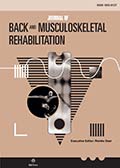Authors: Do, Junghwa | Lim, Woo-Taek | Kim, Dae Yul | Ko, Eun Jae | Ko, Myoung-Hwan | Kim, Geon Woo | Kim, Ji Hye | Kim, SooBin | Kim, Hwal
Article Type:
Research Article
Abstract:
BACKGROUND: Chronic stroke can impair cardiopulmonary function, mobility, and daily activities. This study assessed the impact of robot-assisted gait training (RAGT) on such impairments. OBJECTIVE: To investigate the effects of robot-assisted gait training on cardiopulmonary function, walking ability, lower extremity function and strength, activities of daily living (ADLs), and blood test results among individuals with chronic stroke. METHODS: A multicenter, prospective, single-blinded, randomized controlled trial with 22 chronic stroke participants compared RAGT against a control exercise regimen. RAGT involved three days weekly sessions of high-intensity interval training for 8 weeks (24 sessions) with
…a Morning Walk® device. The control group also performed home exercises. (24 sessions) Measures included VO2 max, Functional Ambulatory Category, 2-minute walk test, 10-meter walk test, Motricity Index-Lower, Korean version of the Fugl-Meyer Assessment Scale, Modified Barthel Index, Berg Balance Scale, muscle strength, InBody body composition, and blood tests (cholesterol, lipid, glucose). RESULTS: RAGT significantly improved VO2 max, gait, balance, and lower limb strength compared with controls, with significant improvements in 2-minute walk test, 10-meter walk test, Motricity Index-Lower, and Fugl-Meyer Assessment outcomes. No changes were seen in muscle mass or blood markers. CONCLUSION: RAGT enhances cardiopulmonary function and ambulatory capacity in chronic stroke patients, underscoring its potential in stroke rehabilitation.
Show more
Keywords: Cerebrovascular accident, robotics, high-intensity interval training, rehabilitation
DOI: 10.3233/BMR-230385
Citation: Journal of Back and Musculoskeletal Rehabilitation,
vol. 37, no. 5, pp. 1309-1319, 2024
Price: EUR 27.50





